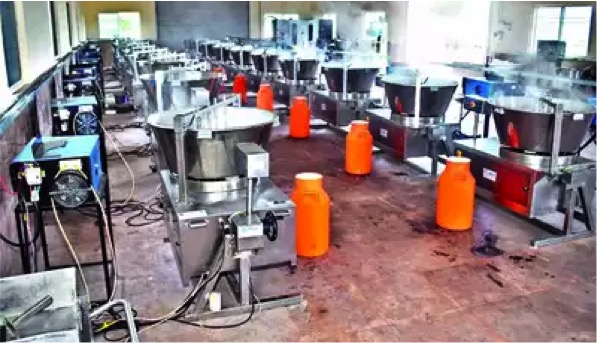Vijay Jogdand, a former zilla parishad teacher, and currently an entrepreneur from Bhoom in Dharashiv, has established a solar-powered induction-based khoya manufacturing unit.
Khoya, a dairy product widely used in South Asian cuisine, is traditionally produced by simmering milk until it thickens. However, this process requires burning four kilograms of wood to process one kilogram of milk.
With the khoya units in Dharashiv producing over 25 tonnes of khoya daily, it entails felling over five lakh trees annually. This has led to a significant loss of green cover in the district. Considering the fast-depleting green cover in the district due to rampant cutting of trees, then district collector Deepa Mudhol-Munde passed an order imposing a ban on tree cutting.
Jogdand said that despite this ban, the cutting of trees continued, but he decided to switch over to some alternative sources of energy
Khoya is used for preparing prasads by most temples and is used by some leading kulfi brands in Pune, Mumbai, Bangalore, apart from leading sweets manufacturing brands in the country. Recognizing the environmental impact of this industry, Jogdand decided to explore alternative energy sources. After experimenting with kerosene, diesel, and electricity over four years, he finally made a breakthrough with solar power, which turned out to be most affordable. His decision was influenced by the fact that Osmanabad district is considered one of the most preferred destinations for solar energy in the country.
Jogdand’s solar-powered induction unit, which dries up 80% of water present in milk to prepare pure khoya, is powered by 500 kw solar panels. The cost of the solar project is equivalent to the money spent on wood by the units over four years. However, the project has a life of over 25 years, making it a long-term, sustainable solution. Furthermore, the government provides a 35% subsidy on solar power projects, making it a financially viable option.
This innovation has the potential to revolutionise the dairy industry. If solar-powered induction is implemented in the manufacturing of other dairy products like paneer, cheese, ghee, and traditional sweets, it could save several lakh trees from being cut down. This pioneering initiative has already caught the attention of NITI Ayog members, who have visited Jogdand’s unit and are planning another visit soon.
The khoya making machine is a highly functional and user-friendly that has been constructed following requirements from customers. The machines can be manufactured in various models and capacities. The machine is designed to be automatic and semi-automatic, with different power requirements. The machine is made of stainless steel, ensuring durability and hygiene. The cost of the machine varies, depending on model and capacity.
Jogdand’s story is a testament to the power of innovation and sustainability. It serves as an inspiration for others to follow suit, paving the way for a greener and more sustainable future. His efforts highlight the importance of adopting renewable energy sources and sustainable practices in industries. It also underscores the role of individual initiative and entrepreneurship in driving environmental conservation and sustainable development. His solar-powered khoya manufacturing unit stands as a beacon of hope for a greener tomorrow, demonstrating that sustainable practices can go hand in hand with economic growth and development.
Source : The Times of India Dec 07 2023

